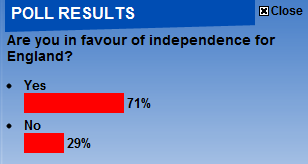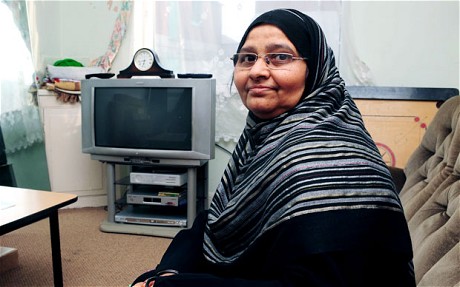There is a misguided belief in “Britain” amongst the political classes, a belief that below the surface there is a common British identity that unites us all and will stave off the forces of celtic nationalism. Their obsession with celtic nationalism and indifference to English nationalism will come back to bite them in the arse but that’s a different topic.
 I’ve just got back from a fortnight’s holiday – the first week was spent in Somerset and the second week in Ceredigion (or Cardiganshire as it used to be called). There was an abundance of English flags in Somerset (Burnham-on-Sea to be exact) but not to the exclusion of the British flag, just a lot more St George’s Crosses than the butchers apron. Wales was different though (at least the part of Wales we stayed in) – the only British flag I saw was, ironically, outside the Welsh Assembly building in Aberystwyth where it occupied one of the “other” flag poles to the side of the Welsh flag, the other “other” pole sporting the ring of stars logo of the EU.
I’ve just got back from a fortnight’s holiday – the first week was spent in Somerset and the second week in Ceredigion (or Cardiganshire as it used to be called). There was an abundance of English flags in Somerset (Burnham-on-Sea to be exact) but not to the exclusion of the British flag, just a lot more St George’s Crosses than the butchers apron. Wales was different though (at least the part of Wales we stayed in) – the only British flag I saw was, ironically, outside the Welsh Assembly building in Aberystwyth where it occupied one of the “other” flag poles to the side of the Welsh flag, the other “other” pole sporting the ring of stars logo of the EU.
Flags aren’t the only symbol of nationhood and cultural independence of course and this is where the Welsh have the English at an advantage: the Welsh language. People in the street, in cafés and shops spoke Welsh to each other. Not just old people who grew up in a time when Welsh communities were often isolated and the Welsh language survived simply because they weren’t exposed to English, it was people my age and most importantly, young people. Welsh kids sitting in cafés with their family quite easily swapped and changed between English and Welsh depending on who they were talking to without hesitation and they are the ones who will decide what the de facto first language of Wales is in a decade or so.
Road signs are an indication of the change in the status of the Welsh language. Dual-language signs were permitted in 1965, a national roll-out started in 1972 and until relatively recently they have generally been in the form of English road signs with Welsh translations. The opposite is now true in most of Wales – the road signs are in Welsh with English translations. English speakers are accommodated alongside Welsh rather than the other way round such as you might find in arab countries where the latinised version place names are included underneath the arabic.
English being the lingua franca of international trade and diplomacy has many advantages on the world stage but at home it takes away one of the most obvious things that unites a people and sets them apart from their neighbours. If England had a unique language of its own in everyday use – pockets of Old English speakers, perhaps, that could be used as a starting point – then the English identity would be a lot stronger than it is now and we wouldn’t be facing problems such as the threat from Britification and the public’s willingness to accept institutional discrimination as the price of the union.
Wales, like Scotland, has been lost by the British. The symbols of British cultural imperialism that you see in England just don’t exist in the celtic nations. The companies and political parties investing in Britishness are limiting themselves to an increasingly narrow section of English society who still believe in Britain. Support for English devolution is consistently falling just shy of the 70% mark whilst support for English independence has jumped to 36% in a Comres poll published in July this year. A TNS-BMRB opinion poll published in June this year showed that support for Scottish independence has risen to 37% (51% in people under 24) and in Wales the most recent opinion poll I can find is 2007 which shows support for independence at just 12%. Support for devolution in Scotland was 70% in a 2009 Populus poll, the Welsh referendum on extending devolution this year was 64.5% and the last poll I’ve seen in England was 67%. Support for devolution in England is higher than in Wales and almost as high as Scotland. But the independence figure is the one that is most interesting – almost as many English people support English independence as Scots do for Scotland (and significantly more than support Welsh independence) but the rate at which support for independence is increasing in England far outstrips any increase in support that Scotland has ever seen.
Companies have already realised that Britain is a toxic brand in Scotland and Wales which is why you will rarely find anything overtly British in shops and supermarkets outside of England. The same goes for political parties – there is not a single -England arm of any UK political party but they all have -Scotland and -Wales arms. Charities and non-profit organisations are the same – there is an Age Scotland, Age Cymru and Age UK; there is a British Medical Association (BMA) Scotland, BMA Wales and plain old “the BMA” for England. What they have failed to notice is the increasing irrelevance and even opposition to “Brand Britain” in England and that will cost them dearly in the very near future.
The union could still have a place in our future, albeit in a significantly different form to the current union but it will only survive the next few years if it is reconfigured on the basis of fairness, equality and respect for all the people of these four nations. There is a small (and I mean small – a couple of years at the most) window of opportunity for the British to save their union but they will need to put their imperial past behind them and start thinking the unthinkable: most of “Britain” isn’t British any more.



 This is, of course, what they said about directory enquiries. Before the replacement of the 192 service with 118 number, it cost 50p for a directory enquiries search and it was free from BT phone boxes. Now it’ll now cost you at least £1.75 assuming you can do the whole thing from start to finish in less than a minute.
This is, of course, what they said about directory enquiries. Before the replacement of the 192 service with 118 number, it cost 50p for a directory enquiries search and it was free from BT phone boxes. Now it’ll now cost you at least £1.75 assuming you can do the whole thing from start to finish in less than a minute.
 I’ve just got back from a fortnight’s holiday – the first week was spent in Somerset and the second week in Ceredigion (or Cardiganshire as it used to be called). There was an abundance of English flags in Somerset (Burnham-on-Sea to be exact) but not to the exclusion of the British flag, just a lot more St George’s Crosses than the butchers apron. Wales was different though (at least the part of Wales we stayed in) – the only British flag I saw was, ironically, outside the Welsh Assembly building in Aberystwyth where it occupied one of the “other” flag poles to the side of the Welsh flag, the other “other” pole sporting the ring of stars logo of the EU.
I’ve just got back from a fortnight’s holiday – the first week was spent in Somerset and the second week in Ceredigion (or Cardiganshire as it used to be called). There was an abundance of English flags in Somerset (Burnham-on-Sea to be exact) but not to the exclusion of the British flag, just a lot more St George’s Crosses than the butchers apron. Wales was different though (at least the part of Wales we stayed in) – the only British flag I saw was, ironically, outside the Welsh Assembly building in Aberystwyth where it occupied one of the “other” flag poles to the side of the Welsh flag, the other “other” pole sporting the ring of stars logo of the EU. I’ll concentrate more on the lack of a functioning grammar school system as I’ve done the funding thing to death on this blog over the years. It’s an indisputable fact that some people are thinkers and some people are doers. Some people’s brains are wired for academic education and some are wired for vocational education. The two tier education system that we used to have with grammar schools catered for this difference by filtering out the children that were capable of an academic education and sending them to grammar schools and sending those that weren’t capable of a purely (or primarily) academic education to comprehensive schools where they could get a well-rounded education.
I’ll concentrate more on the lack of a functioning grammar school system as I’ve done the funding thing to death on this blog over the years. It’s an indisputable fact that some people are thinkers and some people are doers. Some people’s brains are wired for academic education and some are wired for vocational education. The two tier education system that we used to have with grammar schools catered for this difference by filtering out the children that were capable of an academic education and sending them to grammar schools and sending those that weren’t capable of a purely (or primarily) academic education to comprehensive schools where they could get a well-rounded education. Labour councillors have come out in opposition to the march and are getting behind Councillor Mike Ion’s campaign to deny the EDL their right to peaceful protest on the basis that he doesn’t agree with them, rather than concerns about them causing trouble. Councillor Ion does, however, express concerns about violence erupting if fascist left wing thugs like UAF come out to hold their usual violent counter-protests. Councillor Ion’s campaign has even attracted the support of the new leader of Telford & Wrekin Council, Kuldip Singh Sahota which doesn’t bode well for the next four years.
Labour councillors have come out in opposition to the march and are getting behind Councillor Mike Ion’s campaign to deny the EDL their right to peaceful protest on the basis that he doesn’t agree with them, rather than concerns about them causing trouble. Councillor Ion does, however, express concerns about violence erupting if fascist left wing thugs like UAF come out to hold their usual violent counter-protests. Councillor Ion’s campaign has even attracted the support of the new leader of Telford & Wrekin Council, Kuldip Singh Sahota which doesn’t bode well for the next four years.
 The British government’s ePetitions site has gone live today and failed spectacularly. Even this late in the day it’s still crashing more often than not as it’s not been scaled adequately for the feeding frenzy that was inevitable for its launch. Should have hosted it in a cloud with some other online services that have an annual peak later on in the year and used the latent capacity.
The British government’s ePetitions site has gone live today and failed spectacularly. Even this late in the day it’s still crashing more often than not as it’s not been scaled adequately for the feeding frenzy that was inevitable for its launch. Should have hosted it in a cloud with some other online services that have an annual peak later on in the year and used the latent capacity. One option would be to have a separate English Parliament with the same powers as the Scottish Parliament. As my right hon. and learned Friend the Member for Kensington said, and as others have argued, the difficulty with that is that England would represent more than 80% of the population and more than 80% of the gross domestic product in one unit. I cannot think of a stable modern democracy with an advanced economy where there is such an overwhelming dominant part in a federation. Any other country with a federal system contains two or more big states that balance each other out. For example, Canada contains Ontario and Quebec, and Germany contains Bavaria and North Rhine-Westphalia. If England were to be a separate entity in a federal system, the arrangement would have too much of an imbalance.
One option would be to have a separate English Parliament with the same powers as the Scottish Parliament. As my right hon. and learned Friend the Member for Kensington said, and as others have argued, the difficulty with that is that England would represent more than 80% of the population and more than 80% of the gross domestic product in one unit. I cannot think of a stable modern democracy with an advanced economy where there is such an overwhelming dominant part in a federation. Any other country with a federal system contains two or more big states that balance each other out. For example, Canada contains Ontario and Quebec, and Germany contains Bavaria and North Rhine-Westphalia. If England were to be a separate entity in a federal system, the arrangement would have too much of an imbalance. One of the very few restrictions the
One of the very few restrictions the 
